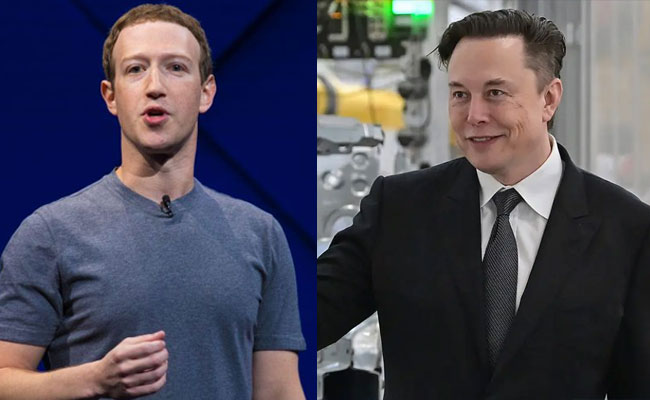Washington (The Conversation): While the cage fight between Meta CEO Mark Zuckerberg and Tesla CEO Elon Musk seems to be on hold, if these men do ever end up sparring, it'll give a whole new meaning to the term "tech bro."
The two billionaires' business interests have butted heads in the past: Musk's 2016 test launch of a SpaceX rocket destroyed Zuckerberg's USD 200 million satellite. In 2022, Musk said Zuckerberg shouldn't dominate social media and encouraged people to abandon Meta-owned Facebook. Meta also recently launched Threads, which competes directly with Musk's X, formerly known as Twitter.
But threatening to beat the pulp out of each other represents a new if not bizarre form of one-upmanship for the two men. At one point, it was rumored that the livestreamed fight would take place in Rome's Colosseum, where gladiators once gruesomely battled to the death.
What in the name of Maximus is going on?
Though Musk and Zuckerberg have attempted to frame their pugilistic pursuit as a once-in-a-generation event, they are far from alone. They join the ranks of other high-profile men in public and political positions who have shown off their physical strength to burnish their status.
As a gender scholar, I've seen how these fights let's call them "performances of virility" tend to coincide with beliefs that masculinity is either in crisis or under attack.
Money can't buy masculinity
You don't usually see two wealthy white billionaires duking it out. So what would Musk and Zuckerberg gain from fighting each other?
As sociologist Scott Melzer writes in his study of fight clubs, "Manhood Impossible," fighting is culturally associated with masculinity, and U.S. culture celebrates men's violence in the right contexts.
For white-collar white men, Melzer explains, fighting can help them to feel they have passed a test of adulthood and fulfilled the cultural requirement of strength. The fighting helps them prove to themselves that they are "real men," despite their soft probably manicured hands.
To me, the chest puffing between Musk and Zuckerberg is a desperate display of masculinity for two tech nerds with deep pockets. They say money can't buy happiness. Perhaps money can't buy masculinity, either.
Kris Paap, author of "Working Construction," explains that men who don't take risks are often seen by their peers as weak and effeminate. Men who risk their health and well-being, on the other hand, prove their bravado for the respect of their peers.
This is particularly the case for working-class men. But politicians have also put on gloves to fight for admiration and political clout through displays of physical prowess.
In 2012, Justin Trudeau squared off against Senator Patrick Brazeau in a boxing match. A member of Canada's Parliament who came from money and political royalty, Trudeau declared before the match that he was "put on this planet to do this I fight and I win."
After emerging from the bout victorious, Trudeau's image as a scrawny nepo baby all but evaporated. Three years later, he became prime minister just like his dad.
There are countless examples of other powerful men looking to showcase their virility. Russian President Vladimir Putin infamously rode horses shirtless, while U.S. President Joe Biden once said that when he was in high school, he would have taken Donald Trump "behind the gym and beat the hell" out of him.
For almost two centuries, performances of masculinity from William Henry Harrison to Donald Trump have been a part of successful U.S. presidential campaigns.
The end of men again and again
It is no coincidence that Musk vs. Zuckerberg comes at a time when there is popular perception that masculinity is in crisis. Women are obtaining college degrees at a faster clip than men, while income gaps are closing. Suicides and overdoses among men often termed "deaths of despair" are on the rise.
Belief in a "crisis of masculinity" spikes during times of progressive social change. And proponents of this view tend to blame feminists and other social progressives for critiquing traditionally masculine mores and values, which, they claim, is causing men to spiral.
Gender scholars point to the turn of the 20th century and the 1990s as other moments of social change that sparked similar anxieties.
In 1890, moves toward coeducation stoked debates around girls and boys being taught the same curriculum. Advocates suggested that sex shouldn't matter in the classroom and that girls' education should prepare them for jobs outside the home.
This didn't go over well with men who benefited from gender segregation. The Boy Scouts of America actually emerged in 1910 so that boys were assured a space where girls and women weren't allowed and where boys would be "sufficiently" acquainted with masculinity.
Similarly, the emergence of identity politics in the 1990s, which highlighted rights-based ideologies, scrutinized, in particular, the privileges of white men.
Today, social progress whether it's more women in the workplace, more women in political office or girls permitted to join what is now referred to as "the Scouts" seems to stoke men's insecurities.
You can see it in the popularity of men's rights advocates like Jordan Peterson, who claims men are being asked to castrate themselves in the name of equality. And you can see it in conservative commentator Ben Shapiro's scorn toward the "Barbie" movie, which has been lauded for calling out patriarchal values.
In these moments, men have historically taken predictable actions to reclaim the idea that they are inherently different from women and thus belong in different spaces.
Sociologist Martha McCaughey has pointed out how evolutionary biology has become the popular way to argue that men just can't help their "innate propensities."
This includes the urge to dominate others, whether that's in business, in bed or, yes, in the ring.
Let the Truth be known. If you read VB and like VB, please be a VB Supporter and Help us deliver the Truth to one and all.
Bengaluru (PTI): Karnataka Chief Minister Siddaramaiah on Monday urged Prime Minister Narendra Modi to initiate evacuation preparedness, enhance diplomatic outreach and establish an inter-ministerial mechanism to protect Kannadigas and other Indians amid escalating geopolitical tensions across parts of the Middle East.
In a letter to PM Modi, Siddaramaiah expressed grave concern over the rapidly evolving security situation in the region, which has led to flight cancellations and widespread uncertainty for residents, workers, students and travellers from Karnataka and across India.
Referring to recent advisories issued by the Ministry of Civil Aviation regarding airspace restrictions and Notices to Airmen (NOTAMs) declared by several West Asian countries, the chief minister said a large number of Kannadigas and other Indian nationals have been stranded, particularly in major transit hubs such as the UAE, including Dubai.
"The evolving security environment, including hostilities and civilian airspace closures, has generated widespread uncertainty and distress among affected individuals and their families in Karnataka and across India," the chief minister said in the letter.
Given the gravity and fluid nature of the situation, Siddaramaiah has urged the Centre to strengthen diplomatic outreach by enhancing engagement through Indian Embassies and Consulates to ensure continuous monitoring, protection, and guidance for Kannadigas and other Indian nationals in affected areas.
He also urged for preparedness to initiate priority evacuation or special repatriation flights, should circumstances so require, to facilitate the safe and timely return of stranded citizens.
The chief minister has also sought for establishment of an inter-ministerial task force to streamline communication between the Ministry of External Affairs, Ministry of Civil Aviation, state governments, and airline operators.
He urged the Centre to set up a centralised digital mechanism for registration, tracking, and real-time dissemination of advisories for families of Kannadigas and other Indian nationals.
Siddaramaiah also requested advisory directions to airlines to extend flexibility in travel schedules, waive additional charges, and provide humanitarian assistance wherever necessary.
He said that a communication from the Office of the Chief Secretary has already been addressed to the Ministry of External Affairs requesting urgent coordination to safeguard Kannadigas and other Indian nationals and to explore appropriate repatriation measures.
Siddaramaiah said the Karnataka government has activated the State Emergency Operations Centre and all District Emergency Operations Centres to function round-the-clock.
"We are in continuous coordination with the Karnataka Resident Commissioner's Office in New Delhi and the Rapid Response Cell of the Ministry of External Affairs. Senior nodal officers are designated for immediate liaison with Union authorities to ensure seamless cooperation," Siddaramaiah said in the letter.
Emphasising the contribution of the Indian diaspora in West Asia, including thousands of Kannadigas, Siddaramaiah expressed hope that the Centre would ake all necessary and timely steps to ensure their safety, dignity, and well-being.
"The Government of Karnataka assures its fullest cooperation in all efforts undertaken in this regard," he added.




_vb_93.jpeg)
